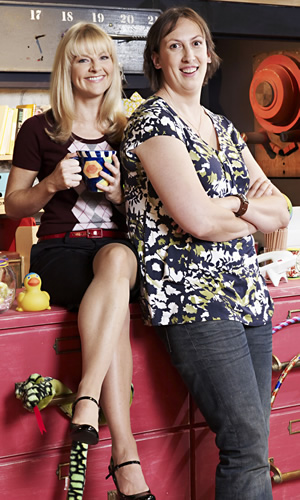Sitcom with Paul Kerensa
Monday 5th December 2011

Comedy writer and script editor Paul Kerensa (Not Going Out, Miranda etc) offers his thoughts on sitcom writing...
Sitcom-writing. What's the secret? Easy. Character and conflict. And the set-up/fail situation. And the weekly reset. And the inciting incident. And the circle of failure. And the twenty-two building blocks. And creating the pseudo-family. And the mythic folklore or hero/mentor/antagonist/gatekeeper. And chasing your characters up a tree and throwing rocks at them. And, I dunno, jokes.
There are so many dos and donts to sitcom, I sometimes wonder if all of these could be followed to make the perfect sitcom. I suspect the opposite would occur. Is half-an-hour really long enough to include all of this, let alone the American system (where much of this comes from), where you end up with 22min of sitcom time?
Don't get me wrong: they're all useful. Pick a favourite sitcom episode and you'll probably be able to apply a handful of these guidelines. But all of them? Tricky. Some sitcom episodes work in spite of these 'rules' - others work because they deliberately flout them.
Granted, the first rule is a great one: Character is everything. Whether it's Miranda or Mainwaring, Blackadder or Bouquet. You may have a marvellous idea in your head for a sitcom set in a law firm (there's been one: Chambers), or in an airline (The High Life, Cabin Pressure), or in a school (Chalk, Bonjour La Classe), but unless you begin with a cracking character, your setting will just feel like three walls facing an audience.
Instead, think of a world that can be inhabited by an ambitious chancer like Delboy, or a hen-pecked snob like Fawlty, or an old-before-his-time teenager like Will from The Inbetweeners. If that then leads you to a market-stall in Peckham, or a Torquay hotel, or a comprehensive school, then so be it.

What's better than Character? Characters. So who brings out the worst in your main character? Who complements them? Who reflects what they want to be, or what they find frustrating? Perhaps go for difference in physical size like Miranda and Stevie (pictured), as well as difference in organisational skill - they will drive each other mad. Or maybe difference in class, like the Blackadder hierarchy of George / Edmund / Baldrick. Or create characters with differences in morals, as in the Bluth family. Either way they should not be thought of as individuals placed into the sitcom setting. It's not so much a world of characters as it is of relationships. It's how they bounce off each other in, ideally, a small space you've created for them, like the World War I trenches, or a prison cell, or a Prime Minister's office.
So you have a main comedically-ripe character, you have characters orbiting this lynchpin to wind them up and set them going, you have a world in which they live. Now you could do with a plot or 6 (or 22-24 if you're American). And much as you could just think, "What if this week our characters go on holiday?" or "Let's send them to the zoo!" - how much nicer to be propelled into your plotlines by some character flaw or something emanating from the relationships you've developed? So it might be a jealousy over money in the Bluth family of Arrested Development, or an attempt by Lee to show Lucy he's mature enough to look after a baby in Not Going Out. Also it's a nice luxury if the storyline itself is inherently funny, rather than just hoping laughs will come when it's up and running. Yes, a tax return might be a cause of frustration and therefore be a storyline for you... but it's a bit dry. A storyline where a character is dragged to a funeral without knowing who's died - well now it's sounding comedic, especially if that character is then roped into doing the obituary to the unknown deceased.
Speaking of comedy, then you may want to add some jokes. Or not. Or just something vaguely funny in there that might make us realise it's not a tragedy. It doesn't have to be set-up and punchline. It could be characters saying things in a slightly droll fashion. It could be visual gags. It could be darkly comic, excruciatingly embarrassing setpieces. You know what comedy makes you tick. Just don't forget to put it in.

This is all a bit Sitcom 101 - character, other characters, relationships, setting, plotlines, jokes... But then I constantly forget myself, so it's nice to be reminded. I know that having written this, in about an hour I'll suddenly have an idea for a sitcom set in a shoe shop or something, and just starting writing some shoe shop jokes, forgetting once again that it's nice if you have some characters and relationships in place first before writing those gags.
At a sitcom writing seminar at Greenbelt Festival this summer, one key feature that came out of it was the uselessness of latching onto sitcom writers to gain your success. A writer reading your script, unless offered as part of a script doctoring process, is nigh on useless. That writer will get you nowhere, as he's probably focused more on getting himself much-needed work. A good read of a script will take half-a-day of someone's time, and if you want notes etc, it's a big ask from someone who already spends so long thinking about and writing sitcom scripts that he walks around all day with a headache that pounds on the skull, going 'Set-up, joke, set-up, joke'. Plus there's a legal issue: if I read your script, and have similar lines or ideas in one of my own, you may think I've nicked them from you, and it can be difficult to prove otherwise.
So at the seminar we instead directed keen writers to find producers, who can make their shows, and who, if they read their scripts and like them, may jump for joy at the prospect, not hang their heads as other writers might, at the prospect of a bona fide competitor on the sitcom-writing market.
But given this, dare you trust any of the above tips? Surely I'm wanting to ransack any chance of a threat of quality writing? But no. As we discussed at the seminar, the more quality sitcom writers there are out there, the better for sitcom generally. So I encourage you, whether you use twenty-two building blocks, or chase your characters up trees. Write fine sitcoms. Just don't send them to me - send them to producers.

